Search alphabetically (by title):
- ALL
- #
- 0
- 1
- 2
- 3
- 4
- 5
- 6
- 7
- 8
- 9
- A
- B
- C
- D
- E
- F
- G
- H
- I
- J
- K
- L
- M
- N
- O
- P
- Q
- R
- S
- T
- U
- V
- W
- X
- Y
- Z
Titles
Paul Taylor
|
Filed under: Civil War Era, Civil War in the North, U.S. History, Understanding Civil War History
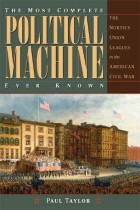
In “The Most Complete Political Machine Ever Known,” Paul Taylor examines the Union League movement. Often portrayed as a mere footnote to the Civil War, the Union League’s influence on the Northern home front was far more important and consequential than previously considered. The Union League and its various offshoots spread rapidly across the North, and in this first comprehensive examination of the leagues, Taylor discusses what made them so effective, including their recruitment strategies, their use of ostracism as a way of stifling dissent, and their distribution of political propaganda in quantities unlike anything previously imagined. By the end of 1863, readers learn, it seemed as if every hamlet from Maine to California had formed its own league chapter, collectively overwhelming their Democratic foe in the 1864 presidential election.
Filed under: Civil War Era, Civil War in the North, U.S. History, Understanding Civil War History
Amy Amendt-Raduege
|
Filed under: Literature & Literary Criticism, Tolkien, Lewis, and Inkling Studies

In 1956, J. R. R. Tolkien famously stated that the real theme of The Lord of the Rings was “Death and Immortality.” The deaths that underscore so much of the subject matter of Tolkien’s masterpiece have a great deal to teach us. From the heroic to the humble, Tolkien draws on medieval concepts of death and dying to explore the glory and sorrow of human mortality. Three great themes of death link medieval Northern European culture, The Lord of the Rings, and contemporary culture: the way in which we die, the need to remember the dead, and above all the lingering apprehension of what happens after death. Like our medieval ancestors, we still talk about what it means to die as a hero, a traitor, or a coward; we still make decisions about ways to honor and remember the departed; and we continue to seek to appease and contain the dead. These themes suggest a latent resonance between medieval and modern cultures and raise an issue not generally discussed in contemporary Western society: our deeply rooted belief that how one dies in some way matters.
Filed under: Literature & Literary Criticism, Tolkien, Lewis, and Inkling Studies
Timothy Mason Roberts
|
Filed under: Civil War Era, Civil War in the North, Understanding Civil War History
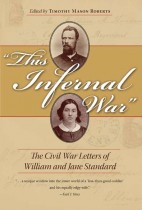
Among collections of letters written between American soldiers and their spouses, the Civil War correspondence of William and Jane Standard stands out for conveying the complexity of the motives and experiences of Union soldiers and their families. The Standards of Lewiston in Fulton County, Illinois, were antiwar Copperheads. Their attitudes toward Abraham Lincoln, “Black Republicans,” and especially African Americans are, frankly, troubling to modern readers. Scholars who argue that the bulk of Union soldiers left their families and went to war to champion republican government or to wipe out slavery will have to account for this couple’s rejection of the war’s ideals.
Filed under: Civil War Era, Civil War in the North, Understanding Civil War History
Martin West
|
Filed under: American History, Award Winners, History
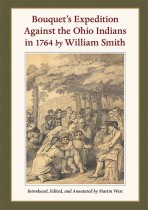
In the fall of 1764, Col. Henry Bouquet led a British-American army into what is today eastern Ohio with the intention of ending the border conflict called “Pontiac’s War.” Brokering a truce without violence and through negotiations, he ordered the Delawares and Shawnees to release all of their European and Colonial American captives. For the indigenous Ohio peoples, nothing was more wrenching and sorrowful than returning children from mixed parentage and adopted members of their families, many of whom had no memory of their former status or were unwilling to relinquish Native American culture.
Filed under: American History, Award Winners, History
Christopher Kennedy
|
Filed under: Music, Regional Interest
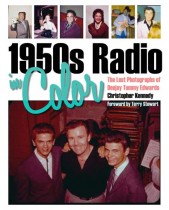
Between 1955 and 1960, popular Cleveland deejay Tommy Edwards photographed the parade of performers who passed through the WERE-AM radio studio for on-air interviews, shooting more than 1,700 Ektachrome slides. Following his death in 1981, most of the collection vanished and was presumed lost. The few images that remained were often reprinted and rarely credited to Edwards, labeled “photographer unknown.” Until now.
Filed under: Music, Regional Interest
C. Snelling Robinson
|
Filed under: Audiobooks, Military History
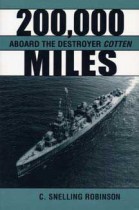
In mid-June 1943, Snelling Robinson, a 20-year-old Harvard graduate and newly commissioned ensign in the U.S. Naval Reserve, joined the pre-commissioning crew of the Fletcher class destroyer USS Cotten. The new crew trained for the remainder of the summer and t hen sailed to Pearl Harbor in time to join the newly established Fifth Fleet. Under t he command of Admiral Raymond Spruance, the Fifth Fleet was given orders to invade Tarawa in the Gilbert Islands in November 1943. This offensive, along with naval battles in the Philippine Sea, the Leyte Gulf, and the invasion of Iwo Jima in February 1945, is chronicled from the perspective of a young deck officer and is integrated with the background of the larger conflict, including the politics of command. After Japan’s surrender, the Cotten became a part of the Occupation Force anchored in Tokyo Bay. Robinson deftly narrates how he and his friends took advantage of their good luck and brought their roles in the war to a fitting conclusion.
Filed under: Audiobooks, Military History
Bill Livingston
|
Filed under: Sports
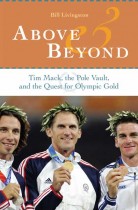
Award-winning sports columnist Bill Livingston follows Mack as he practices one of the world’s most dangerous and demanding sports. Livingston reveals the fascinating subculture of pole vaulting—from Bob Richards, the only man to win Olympic gold twice in pole vaulting; to Sergey Bubka, the most controversial pole vaulter ever; to Don Bragg, a rowdy Tarzan-like character who swung on ropes in his backyard to build upper-body strength; to the stirring duel between Mack and Toby Stevenson as they battled for gold in Athens.
Filed under: Sports
Craig S. Simpson and Gregory S. Wilson
|
Filed under: American History, May 4 Resources, Regional Interest

A deadly confrontation at Kent State University between Vietnam War protesters and members of the Ohio National Guard occurred in the afternoon on May 4, 1970. What remained, along with the tragic injuries and lives lost, was a remarkable array of conflicting interpretations and theories about what happened—and why.
Filed under: American History, May 4 Resources, Regional Interest
Raymond C. Kerns
|
Filed under: Audiobooks, Biography, History, Military History
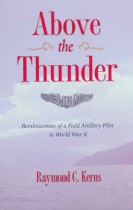
The son of a Kentucky tobacco farmer, Raymond Kerns dropped out of high school after the eighth grade to help on the farm. He enlisted in the Army in 1940 and, after training as a radio operator in the artillery, was assigned to Schofield Barracks (Oahu) where he witnessed the Japanese attack on Pearl Harbor and participated in the ensuing battle.
Filed under: Audiobooks, Biography, History, Military History
Jeffrey J. Malanson
|
Filed under: American History, Audiobooks, New Studies in U.S. Foreign Relations, U.S. Foreign Relations
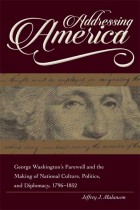
In his presidential Farewell Address of 1796, George Washington presented a series of maxims to guide the construction of a wise foreign policy. He believed, as did generations of his adherents, that if the United States stayed true to the principles he discussed, the country would eventually attain national greatness and international respectability. These principles quickly became engrained in the DNA of what it meant to be an American in the first half of the nineteenth century, shaping the formation of U.S. foreign policy, politics, and political culture. The Declaration of Independence affirmed American ideals, the Constitution established American government, and the Farewell Address enabled Americans to understand their country and its place in the world. While the Declaration and Constitution have persisted as foundational documents, our appreciation for the Farewell Address has faded with time.
Filed under: American History, Audiobooks, New Studies in U.S. Foreign Relations, U.S. Foreign Relations
Subject/Title category archive











